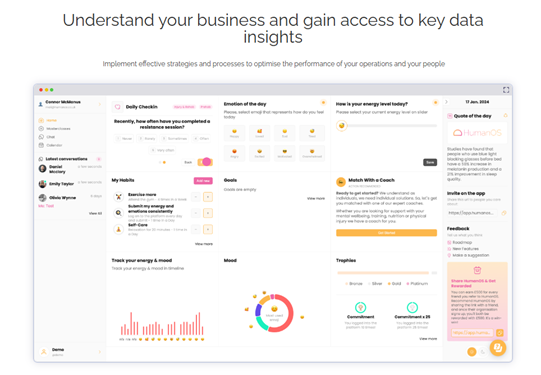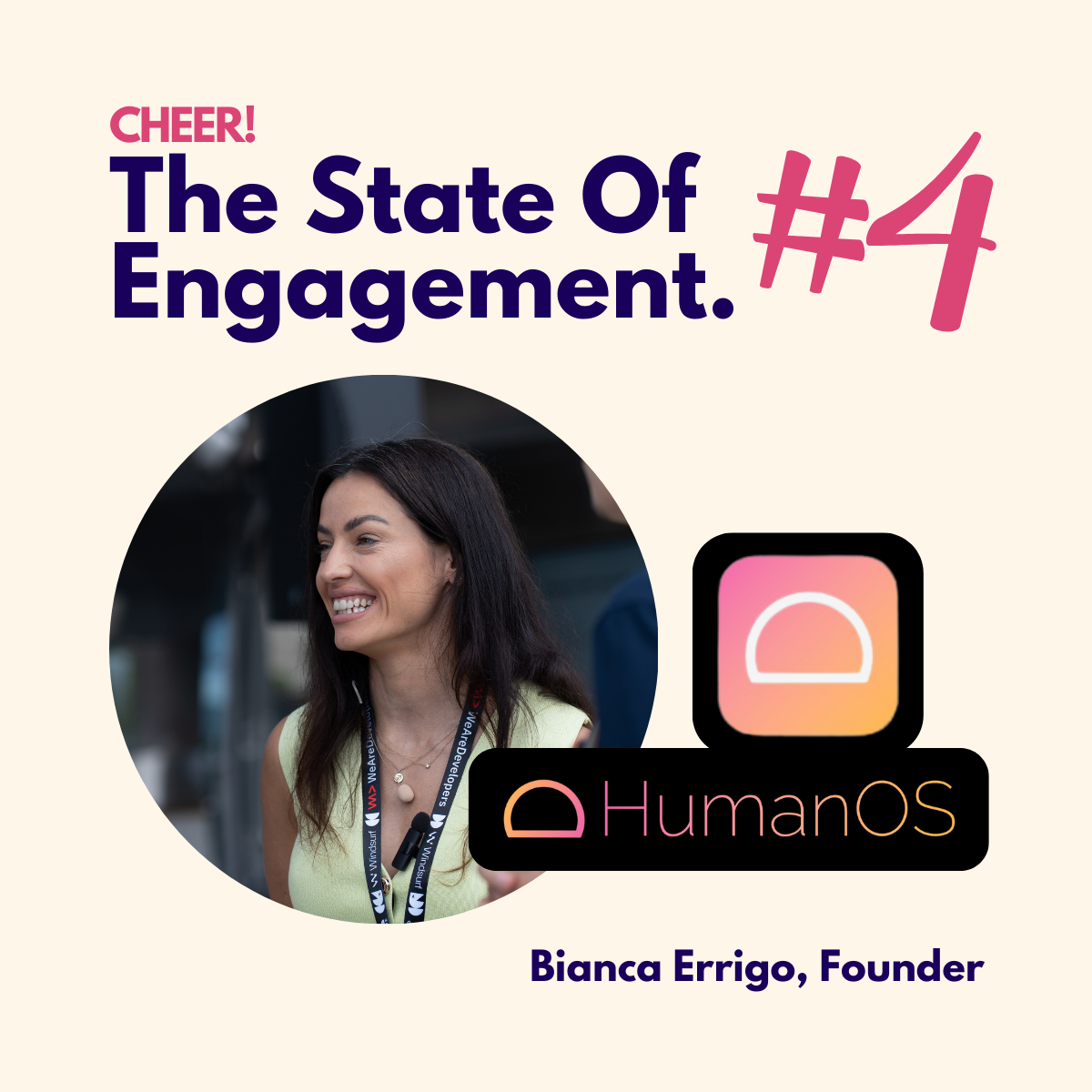The State of Engagement:
Bianca Errigo, Founder, HumanOS
This edition of TSOE explores wellbeing, culture, and the psychology of work with Bianca Errigo, Founder of HumanOS.
HumanOS sits at the intersection of powerful technology and human connection. Their 360° platform helps organisations support diverse teams, enhance culture, and deliver measurable results.
By combining data-driven insights with world-class coaching, HumanOS supports organisations on their journeys of Sustainable High Performance. With average engagement rates over 60% higher than industry averages, HumanOS consistently drives meaningful change in both employee wellbeing and business performance.
Bianca’s background spans psychology, corporate sales, and more than 13,000 hours of 1:2:1 coaching. She has designed and delivered wellbeing strategies and talks for leading organisations including American Express, Snapchat, the NHS, and the University of Cambridge. A sought-after global speaker, podcast guest, and contributor, Bianca is recognised for approaches that move far beyond “a mental health first aider and some free fruit.” Her work addresses systemic challenges such as presenteeism, poor work design, and the lack of intersectionality in workplace wellbeing – always with a science-meets-practicality approach that turns ambition into lasting cultural change.
What engages employees most?
Bianca sees engagement as an outcome of how work is designed and how leaders lead.
Globally, engagement sits at around 21 percent. In Europe it falls to 13 percent, and in the UK closer to 10 percent (something I have spoken about here), ranking us 33 out of 38 countries in Gallup’s 2025 report.
“Nine out of ten UK employees are disengaged at work, which is terrifying,” she says.
She draws on psychology to explain why. Engagement is driven by three human needs: autonomy, mastery and connection (echoed by Rafael Guper in our last edition, see ‘Drive’) If people feel powerless, stuck or isolated, disengagement is inevitable. Leaders need to create environments that allow people to develop, feel control and be part of something meaningful.
Why is disengagement so high?
Bianca sees a mix of outdated structures and poor management support:
- Archaic processes. “Many workplaces still operate with systems designed for the industrial revolution”, she says, “employees spend hours on repetitive, low-value tasks instead of problem-solving, collaborating or being creative.” – something which echoes previous conversations around AI.
- Managers without training. “Too often, people move into management as the only route to progression, even if they dislike managing. Without support, they struggle and their teams feel it.”
- Lack of communication. “Without clarity and transparency, psychological safety is impossible. Employees are left unsure how their work connects to the bigger picture.”
The result? Widespread disengagement and a lack of fulfilment in day-to-day work.
Do businesses really care?
Bianca is clear. Individuals inside organisations care deeply and try to drive change. But at an organisational level, many businesses still do not, at least not until they start losing talent.
At CHEER! we have a theory – not backed by data – that:
- A third of organisations do not get it and never will.
- A third get it but do not know how.
- A third both get it and act on it.
Until the financial impact of disengagement becomes too great to ignore, Bianca believes many companies will continue to treat wellbeing and engagement as secondary.
What gives businesses the edge in attracting talent?
“It’s not about offering a job,” Bianca says. “It’s about offering systems and environments where people grow and thrive.”
She points to Randstad’s research showing that work-life balance has overtaken salary as the number one factor in attracting talent. At Davos, the World Economic Forum echoed this with three themes: balance, belonging and development.
“Candidates are asking: Will this culture deplete me or protect me? The businesses that stand out are those demonstrating psychological safety, inclusion, growth opportunities and autonomy.”

EVP and the pillars
EVP, or Employee Value Proposition, is the balance of what people give and what they get back. I like to break it down into seven pillars:
Brand & Purpose, Culture, Environment, Monetary, Prospects, Relationships, and Wellbeing.
I always ask my guest what they suggest is most important. For Bianca, culture is the multiplier.
She explains, “Culture defines the social norms of behaviour. If your culture normalises overwork and toxic conflict, people will adapt to that. If it normalises balance, recognition and constructive challenge, those behaviours spread just as quickly. Culture is the foundation on which all the other pillars are built.”
This reminded me of a video I saw during a Linkedin scroll that suggests:
𝐶𝑢𝑙𝑡𝑢𝑟𝑒 𝑖𝑠 𝑤ℎ𝑎𝑡 𝑔𝑒𝑡𝑠 𝑟𝑒𝑤𝑎𝑟𝑑𝑒𝑑 𝑎𝑛𝑑 𝑤ℎ𝑎𝑡 𝑔𝑒𝑡𝑠 𝑝𝑢𝑛𝑖𝑠ℎ𝑒𝑑. 𝑃𝑎𝑦 𝑎𝑡𝑡𝑒𝑛𝑡𝑖𝑜𝑛 𝑡𝑜 𝑡ℎ𝑎𝑡. 𝐼𝑡 𝑡𝑒𝑙𝑙𝑠 𝑦𝑜𝑢 𝑒𝑣𝑒𝑟𝑦𝑡ℎ𝑖𝑛𝑔 𝑦𝑜𝑢 𝑛𝑒𝑒𝑑 𝑡𝑜 𝑘𝑛𝑜𝑤.
What are the biggest people challenges right now?
Bianca identifies three major issues across organisations today:
- Presenteeism. Employees are showing up but not fully functioning due to stress, poor mental health or chronic conditions. Deloitte estimates the cost of presenteeism at £26–29 billion a year in the UK, far greater than absenteeism.
- Lack of intersectionality. Too many wellbeing programmes treat employees as one group. In reality, identity and background matter — from gender and race to disability and caring responsibilities. Ignoring this deepens inequalities and leaves people unsupported.
- Work design debt. Endless meetings, context switching and poor systems leave little space for deep work. Companies need to experiment and adapt processes for the modern world, even if they do not get it right first time.
Generational shifts in the workplace
With five generations now in the workplace, Bianca believes millennials hold a unique superpower.
They have lived the hustle culture of older generations but also understand the freedom and flexibility Gen Z demand. “Millennials can speak both languages,” she explains. “They can unite people and help communicate across generations.”
Gen Z, meanwhile, are pushing back harder. They are not willing to accept outdated systems and want purpose, balance and autonomy from the start. This is fantastic!
For leaders, this means emotional intelligence is more important than ever.
Without it, they will struggle to understand or engage younger talent.
Find out more about HumanOS
Follow Bianca on Linkedin
Contact CHEER!
Click here for past editions of The State of Engagement

